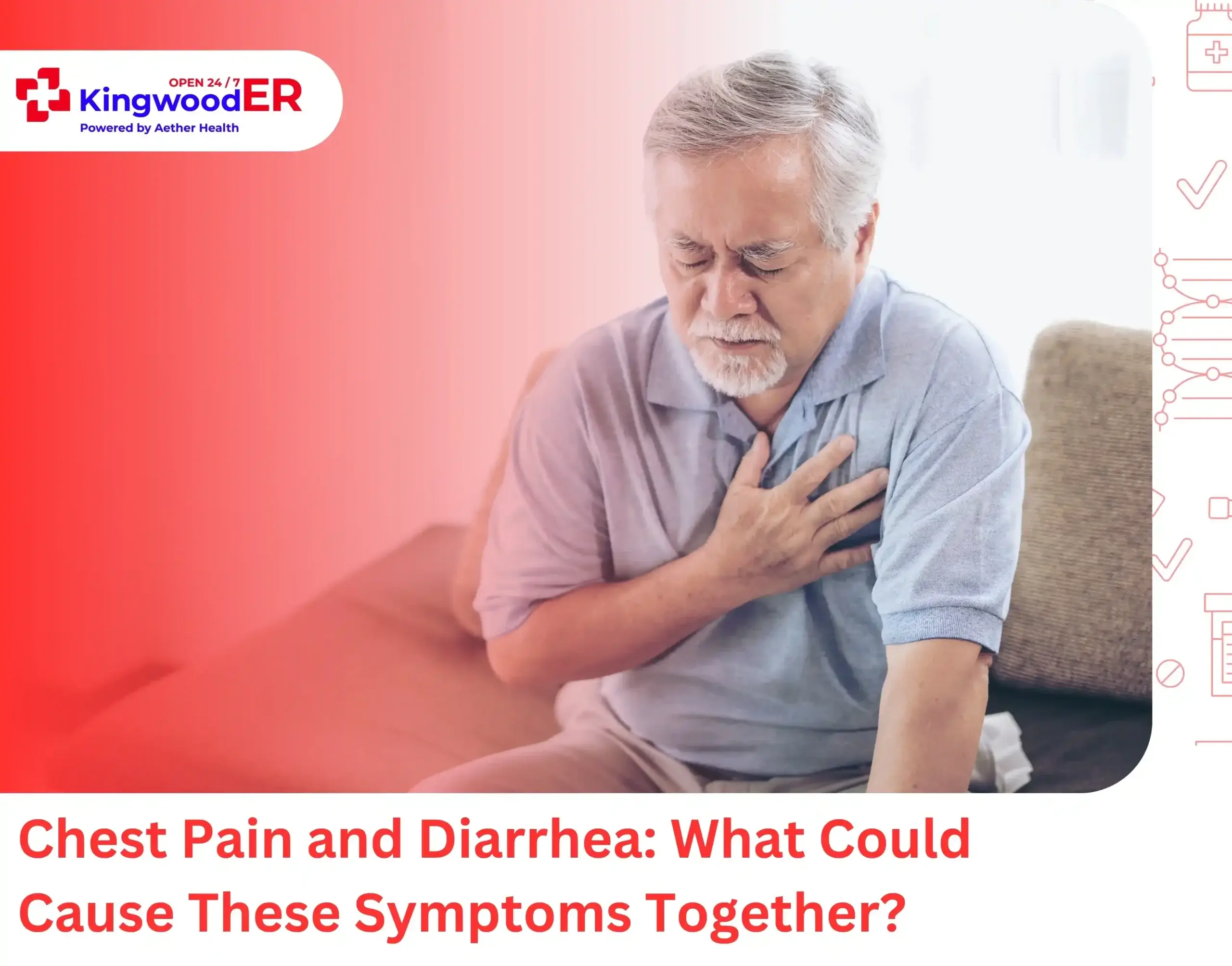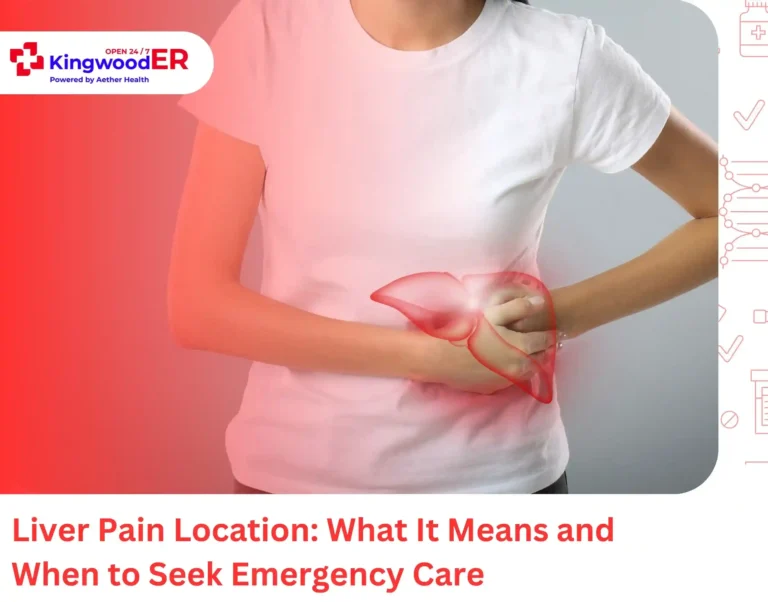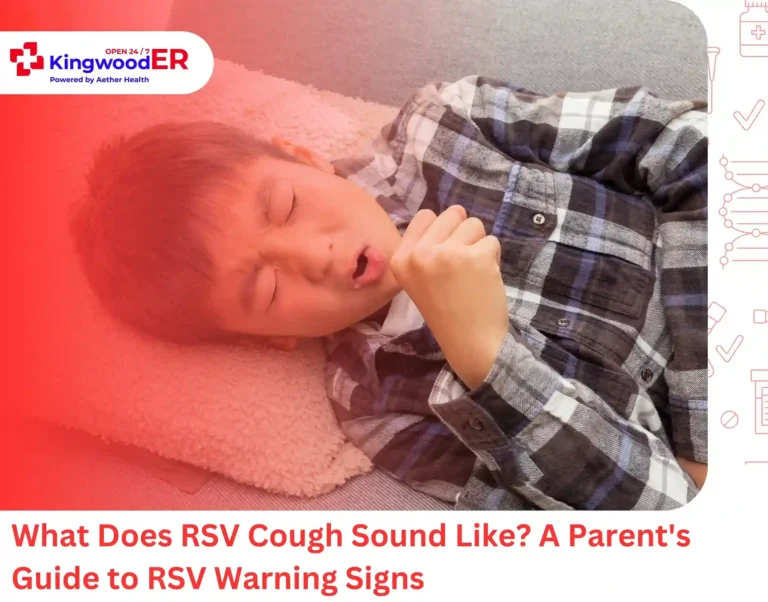The combination of chest pain and diarrhea creates unique diagnostic challenges. While it might be the result of something as simple as indigestion or a stomach virus, in some cases, it could signal a more serious underlying condition.
Chest pain and diarrhea together may indicate heart problems, gallbladder disease, or severe infections. The timing, intensity, and accompanying symptoms determine whether you need emergency care or can manage symptoms at home.
Let’s take a closer look at what might cause chest pain and diarrhea to occur together, how to identify warning signs, and what to do next.
Common Causes of Chest Pain and Diarrhea
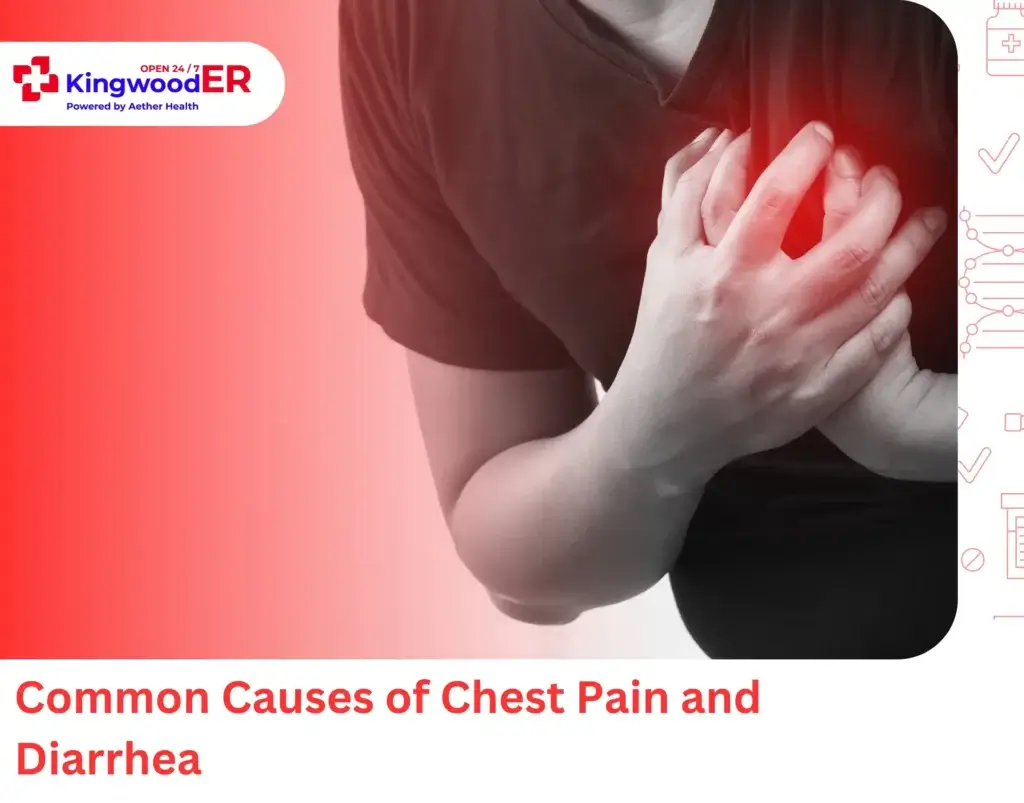
Here are seven conditions that could cause chest pain and diarrhea together:
1. Gastroenteritis (Stomach Flu)
Viral or bacterial infections that cause inflammation of the stomach and intestines can lead to diarrhea, cramping, and sometimes chest discomfort. The chest symptoms typically result from nausea, dehydration, or muscle strain from vomiting. Symptoms develop within 1-3 days and resolve in 3-7 days.
2. Food Poisoning
Consuming contaminated food can cause symptoms like stomach cramps, watery diarrhea, vomiting, and sometimes mild chest pain from gas buildup or strain. Food poisoning symptoms usually peak within 24-48 hours.
3. Indigestion or Acid Reflux
Acid reflux or indigestion can cause upper abdominal discomfort and chest pain, sometimes mistaken for heart problems. If this is combined with diarrhea, especially after eating certain foods, it may point to dietary triggers. Symptoms often occur 1-2 hours after eating spicy, fatty, or acidic foods.
4. Irritable Bowel Syndrome (IBS)
IBS is a functional gastrointestinal disorder that can cause chronic diarrhea, abdominal pain, and even chest tightness or discomfort during stress episodes. Symptoms follow patterns related to specific food triggers or emotional stress.
5. Stress and Anxiety
Emotional stress and anxiety can impact the gut-brain axis, leading to gastrointestinal symptoms like diarrhea. Anxiety chest tightness often accompanies these digestive symptoms during stress episodes.
6. Gallbladder or Pancreatic Conditions
Gallbladder disease or pancreatitis may cause upper abdominal pain that radiates to the chest and back, along with nausea and diarrhea. Pain intensifies after eating fatty meals and requires emergency medical attention.
7. Heart Attack or Cardiac Issues
Although rare, some heart conditions can cause gastrointestinal symptoms. Women, in particular, may experience nausea, indigestion, and diarrhea alongside chest pain during a heart attack. Learning how to differentiate heart attack from other chest pain can be life-saving in these situations.
Is Diarrhea a Sign of Heart Attack?
Diarrhea can occur during heart attacks, though it’s less common than nausea and vomiting. Gastrointestinal symptoms during cardiac events result from the body’s stress response and reduced blood flow to digestive organs.
Women and diabetics often experience atypical heart attack symptoms, including digestive distress. While men typically have crushing chest pain, women may develop sudden nausea, vomiting, or diarrhea alongside chest pressure, jaw pain, or fatigue. These symptoms frequently get misdiagnosed as stomach flu, causing delays in treatment.
Heart attack-related diarrhea differs from typical stomach issues. It develops suddenly without dietary triggers, occurs with chest symptoms or extreme fatigue, and may include cold sweats or shortness of breath. Unlike food poisoning, these symptoms worsen during physical exertion rather than improving with rest.
When to Seek Immediate Medical Attention
Call 911 or go to the emergency room if your chest pain and diarrhea occur with:
- Severe or crushing chest pressure
- Pain radiating to your arm, back, neck, or jaw
- Shortness of breath or difficulty breathing
- Cold sweats, nausea, vomiting, or lightheadedness
- Sudden onset in people over 50 or with heart disease
The combination of chest pain and diarrhea becomes emergency-level when accompanied by fainting, severe dehydration, bloody stools, or symptoms that worsen rapidly. Women experiencing chest discomfort with sudden digestive symptoms should seek immediate evaluation, as female heart attacks often present atypically.
Don’t wait to see if symptoms improve. Emergency departments can quickly distinguish between digestive issues and life-threatening cardiac events through ECGs, blood tests, and imaging.
How Doctors Diagnose Chest Pain and Diarrhea
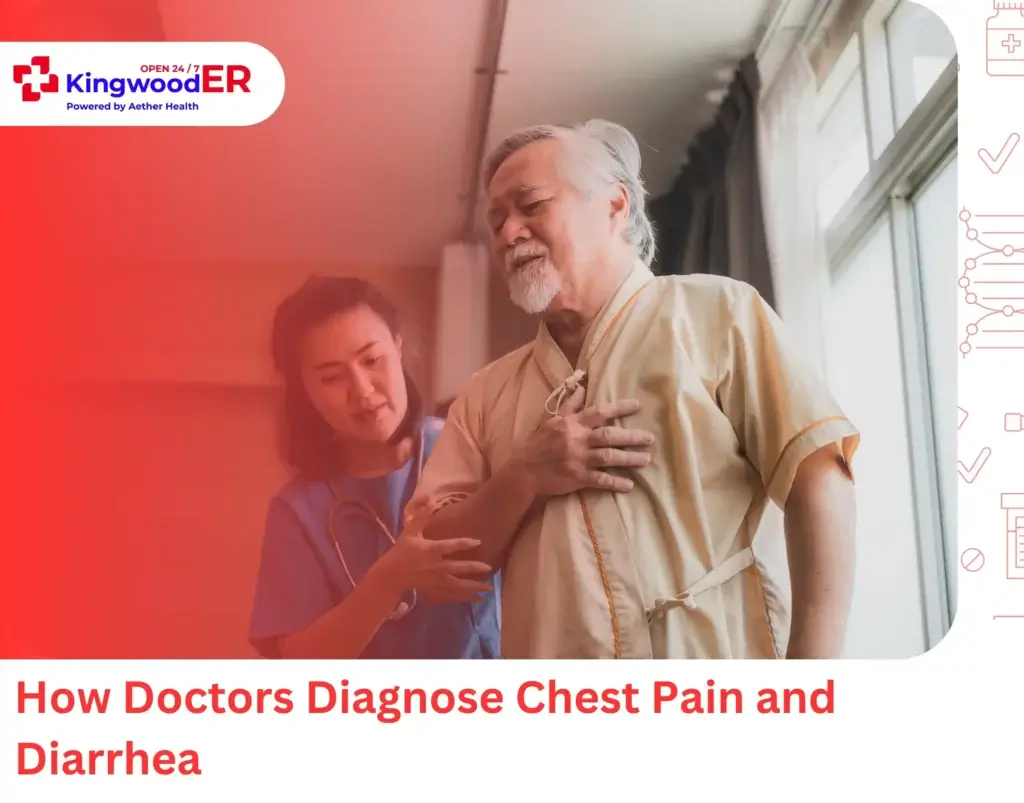
When you visit a healthcare provider, they may ask:
- When did symptoms start?
- Did symptoms begin together or separately?
- What did you eat before symptoms began?
- Do you have heart disease, diabetes, or digestive disorders?
- Are you taking any new medications?
Diagnostic tests may include:
- Blood work – Checks for heart attack markers, infection, and dehydration levels
- Electrocardiogram (ECG) – Rules out heart rhythm problems or cardiac events
- Chest X-ray – Identifies heart abnormalities or lung complications
- Stool sample – Tests for infections, blood, or inflammatory markers
- Abdominal imaging – Endoscopy, ultrasound, or CT scan if gallbladder/pancreatic issues suspected
Cardiac testing is prioritized to rule out life-threatening conditions first. Most emergency evaluations take 2-4 hours, with IV fluids often given for dehydration while awaiting results.
How Chest Pain and Diarrhea Are Treated
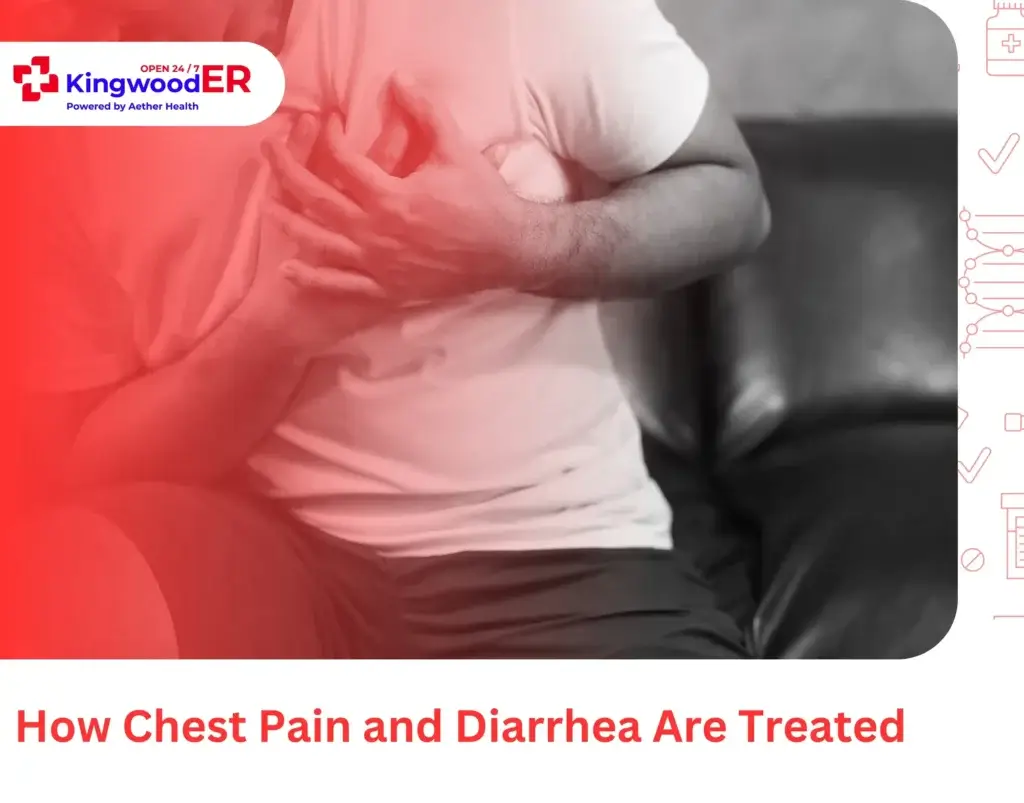
Treatment depends on the underlying cause identified through diagnosis:
- Hydration: Replace fluids and electrolytes if diarrhea is significant
- Antacids or acid blockers: For GERD-related chest pain and digestive symptoms
- Antibiotics: For bacterial infections (only when prescribed)
- Antispasmodics or antidiarrheal meds: For IBS-related symptoms
- Stress management techniques: Helpful if anxiety is a contributing factor
- Hospital care: For severe infections, cardiac issues, or pancreatitis
Take Action When Chest Pain and Diarrhea Occur
Chest pain and diarrhea together can stem from something simple like food poisoning or signal a more serious cardiac or abdominal emergencies.
Trust your instincts. If chest pain feels different from typical heartburn or if diarrhea occurs with concerning symptoms like shortness of breath, seek immediate medical care. Early evaluation provides peace of mind and ensures proper treatment when needed.
FAQs
1. Can anxiety cause both chest pain and diarrhea?
Yes, anxiety can trigger symptoms in both the chest and digestive system due to the gut-brain connection.
2. Should I be concerned about mild chest pain with diarrhea?
If the symptoms are mild and short-lived, they may not be serious. But if you have risk factors for heart disease, get checked to be safe.
3. Can food allergies cause chest pain and diarrhea?
Yes, severe food allergies or intolerances can lead to chest pain and diarrhea.
4. How do I know if it’s indigestion or a heart problem?
Heart-related chest pain often feels like pressure or tightness and may radiate. Indigestion pain is more burning or sharp. When in doubt, seek medical help.
5. What should I eat while recovering from chest pain and diarrhea?
Stick to bland foods like rice, bananas, toast, and broth. Avoid caffeine, fatty foods, and spicy meals until you feel better.
If symptoms persist or worsen, consult your doctor to rule out any serious conditions and get the appropriate treatment.

